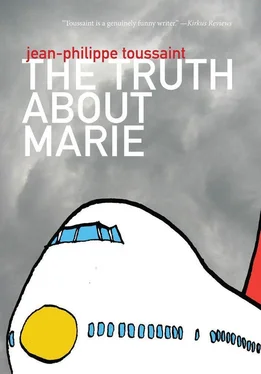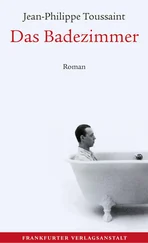For a while I thought that the only time I’d ever seen Jean-Christophe de G. was the night of his death. I’d hardly caught a glimpse of him that night. He’d appeared before my eyes lying flat on a stretcher, carted out of the building at rue de la Vrillière like a figure from a dream, or a nightmare, a specter spontaneously conjured up from nothingness and then vanishing, his image, at once complete, coherent, and detailed, had suddenly materialized before me out of nothing, it came from nothing and returned to nothing, as though created ex nihilo from the very substance of the night — the brusque appearance of this man inert on a stretcher, the frightening pallor of his face behind an oxygen mask, featureless and depersonalized, his sole heraldry, his colors, reduced to his socks, black, fine, delicate, of fil d’Écosse cotton, whose texture and splendor and silver sheen I can still imagine so vividly! I thought, at that moment, it was the first time I’d seen him, but I’d already seen him a few months earlier in Tokyo. I remember the day, in Tokyo, I’d seen him by chance alongside Marie, they weren’t arm in arm but may as well have been, they were together, this had struck me immediately, a man older than she, well into his forties, close to his fifties, not without charm and elegance, he was stylish, sporting a black cashmere overcoat, a dark scarf, his thinning hair combed back. This is the only image I have of him, but his face is without detail and will undoubtedly remain so since I’ve never seen a picture of him.
In the days following Jean-Christophe de G.’s death I looked him up on the Internet and was surprised to find many hits pertaining to him personally, as well as to his family and ancestors. I was able link this information to that which Marie had shared with me, those rare moments when she confided details about their relationship to me. The night of his death Marie had told me how she’d met him in Tokyo at her exhibition’s opening at the Contemporary Art Space of Shinagawa. For obvious reasons, Marie had chosen not to carry on about Jean-Christophe de G. during the days following his death, she was still in shock, she avoided questions concerning him, but she let slip a few details during a dinner we had at the beginning of summer before her trip to Elba, intimate details she regretted having shared shortly thereafter, indiscreet remarks about their private relations, details upon which I seized immediately to dwell and expand on in my imagination. I’d also learned from Marie some information about the drama that had cast a shadow over the last months of Jean-Christophe de G.’s life. I had thus filled in the missing details and examined the murkier zones of his background, buying into the gossip and rumors, giving credence to the scandals mentioned in the press, pure slander, without proof, unmotivated — for there is no evidence, to this day, that Jean-Christophe de G. had ever consciously broken the law.
At times, spurred on by nothing more than a single detail Marie had shared with me, or let slip, or which I’d discovered, I’d allow myself to build the scaffolding of further developments, distorting the facts occasionally, transforming or exaggerating them, even romanticizing them. I may have been mistaken about Jean-Christophe de G.’s intentions, I could easily doubt his sincerity when he confessed to have been betrayed by one of his own. I was capable of believing the defamatory rumors and of finding more reason to suspect illicit dealings. I’m not sure to what extent he was personally implicated in the affair he was accused of, and I ignored the question of whether the rumors of the blackmail of which he was supposedly a victim were well founded (although Marie had told me one night she’d had the feeling he was carrying a weapon during the last days of his life). I may have been mistaken in many of my assumptions about Jean-Christophe de G., but never in those about Marie, I knew Marie’s every move, I knew how she would have reacted in every circumstance, I knew her instinctively, my knowledge of her was innate, natural, I possessed absolute intelligence regarding the details of her life: I knew the truth about Marie.
Of what really went on between Marie and Jean-Christophe de G. the few months they knew each other, during the period of this relationship, which, if one were to make an exhaustive list of all the times they’d met, would amount to no more than a few nights spent together, four or five nights, no more, in between the end of January and the end of June (to which we might add a weekend in Rome, one or two lunches, and a few museum visits), no one can really be sure. I can only imagine Marie’s gestures when with him, her mood and her thoughts, on the basis of information witnessed or inferred, known or imagined, and combined with the grave, painful moments I knew Jean-Christophe de G. to have endured, joining in this way a few incontestable truths to the cracked and incomplete mosaic, full of gaps, contradictions, and inconsistencies, of the last months of Jean-Christophe de G.’s life seen through my eyes.
From the very beginning I’d been mistaken in many respects about Jean-Christophe de G. First, I continued to call him Jean-Christophe whereas his name was Jean-Baptiste. I even suspect I’d done this intentionally so as not to deprive myself of the pleasure of getting his name wrong, not that Jean-Baptiste was a better name, or more elegant, than Jean-Christophe, but the latter simply wasn’t his name, and this posthumous jab, however small, however simple, gave me great pleasure (had his name been Simon I’d have called him Pierre, I know myself). What’s more, I’d always believed that Jean-Christophe de G. was a businessman (which, in truth, he was, in a sense), and that he was a connoisseur of art, that he was a dealer or a collector of international art, and that this was how he’d met Marie in Tokyo. But if it’s true that he purchased artworks from time to time (even if only old paintings, designer furniture, or jewelry from antique shops), this was not his principle occupation. Jean-Christophe de G., like his father, but especially like his great-grandfather, Jean de Ganay, was a prominent figure in French horse racing, a breeder, owner of horses, and member of the French racing society ( La Société d’Encouragement pour l’Amélioration des Races de Chevaux en France ). It was in this respect, as a horse owner, that he’d gone to Japan at the end of January. He had a horse competing in the Tokyo Shimbun Hai, and it’s only by chance that, being in Tokyo at this time, he’d gone to the opening of Marie’s exhibition at the Contemporary Art Space of Shinagawa. And it was here, the night her exhibition was open to the public, that he’d seen Marie for the first time, that he’d met and conquered her (in what order we can only speculate, since it must have happened almost at once).
Ganay’s racing colors — yellow jersey, green cap — had been selected at the beginning of the twentieth century by Jean-Christophe de G.’s great-grandfather, who presided over the Société d’Encouragement from 1933 until his death. This renowned Society, founded with the mission of improving the breeding and racing of horses in France, was created a century earlier by Lord Henry Seymour, also known as Milord the Bastard (who knows where this curious nickname originated, an underworld name, from the mob, from his working-class past, his crooked deals, his sinister ways?), and it is to this Society that we owe the modernization of the Longchamp racetrack, the creation of race officials, and the institution of the first measures, still rudimentary, of testing against doping with saliva samples. It is also worth noting that we owe the establishment of the first antidoping regulations in horse racing to one of Jean-Christophe de G.’s ancestors, given the extent to which the last six months of Jean-Christophe de G.’s life were embroiled in the Zahir Affair, named after his thoroughbred competing in the Tokyo Shimbun Hai.
Читать дальше












